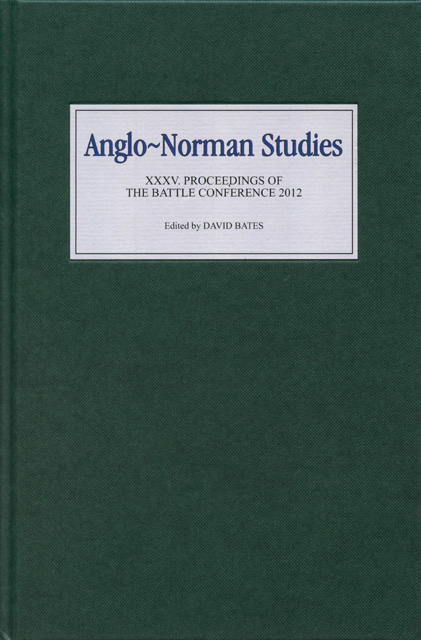Book contents
- Frontmatter
- Dedication
- Contents
- List of Illustrations and Tables
- Editor’s Preface
- Abbreviations
- A Three-Cornered Dynamic of Redemption in the ‘Long’ Thirteenth Century: Villein Manumissions and the Theology of the Incarnation (The R. Allen Brown Memorial Lecture, 2011)
- Femmes en religion, personnes d’autorité: les abbesses normandes (XIe–XIIIe siècles) (The R. Allen Brown Memorial Lecture, 2012)
- The Role of the Curator of the Bayeux Tapestry
- Early Normandy
- The Norman Conquest, Countess Adela, and Abbot Baudri
- Baldric of Bourgueil and the Flawed Hero
- John Bilson (1856–1943) and the Study of Anglo-Norman Romanesque
- The Identity of the Designer of the Bayeux Tapestry
- The Pseudo-Hugh Falcandus in His Own Texts
- The Thirteenth-Century Chronique de Normandie
- Les investitures abbatiales en Normandie: quelques réflexions autour du cas de l’abbaye du Bec-Hellouin (1034–1136)
- Robert Curthose: The Duke Who Lost His Trousers
- Sufficientia: A Horatian Topos and the Boundaries of the Self in Three Twelfth-Century Poems
- Aristocratic Acta in Normandy and England, c. 1150–c. 1250: The Charters and Letters of the Du Hommet Constables of Normandy
- Crime without Punishment: Medieval Scottish Law in Comparative Perspective
- Landscape and Belief in Anglo-Norman England
- Contents of Volumes 1–34
Les investitures abbatiales en Normandie: quelques réflexions autour du cas de l’abbaye du Bec-Hellouin (1034–1136)
Published online by Cambridge University Press: 28 February 2023
- Frontmatter
- Dedication
- Contents
- List of Illustrations and Tables
- Editor’s Preface
- Abbreviations
- A Three-Cornered Dynamic of Redemption in the ‘Long’ Thirteenth Century: Villein Manumissions and the Theology of the Incarnation (The R. Allen Brown Memorial Lecture, 2011)
- Femmes en religion, personnes d’autorité: les abbesses normandes (XIe–XIIIe siècles) (The R. Allen Brown Memorial Lecture, 2012)
- The Role of the Curator of the Bayeux Tapestry
- Early Normandy
- The Norman Conquest, Countess Adela, and Abbot Baudri
- Baldric of Bourgueil and the Flawed Hero
- John Bilson (1856–1943) and the Study of Anglo-Norman Romanesque
- The Identity of the Designer of the Bayeux Tapestry
- The Pseudo-Hugh Falcandus in His Own Texts
- The Thirteenth-Century Chronique de Normandie
- Les investitures abbatiales en Normandie: quelques réflexions autour du cas de l’abbaye du Bec-Hellouin (1034–1136)
- Robert Curthose: The Duke Who Lost His Trousers
- Sufficientia: A Horatian Topos and the Boundaries of the Self in Three Twelfth-Century Poems
- Aristocratic Acta in Normandy and England, c. 1150–c. 1250: The Charters and Letters of the Du Hommet Constables of Normandy
- Crime without Punishment: Medieval Scottish Law in Comparative Perspective
- Landscape and Belief in Anglo-Norman England
- Contents of Volumes 1–34
Summary
This article analyses and eventually rejects the existing orthodoxy that there was a precocious reform of abbatial investitures in Normandy in the eleventh century that anticipated changes elsewhere. It focuses specifically on evidence from the abbey of Le Bec and analyses in detail the content and construction of the text known as the De Libertate Beccensis monasterii, written between c. 1136 and 1140. It then locates its evidence within the context of the considerable liturgical evidence for practice within Normandy and neighbouring regions and proceeds to demonstrate that the De Libertate was both anachronistic in its presentation and designed to reinterpret the abbey’s history for a mid-twelfth-century audience in the light of the 1107 Anglo-Norman settlement of the controversy about investitures. In general terms, the investiture of the abbots at Le Bec should be seen as resembling that elsewhere and to reflect the fact that an abbot’s role became an increasingly priestly one. The article constructs a revised narrative of the abbatial investitures at Le Bec and offers the reflection that every aspect of this history needs to be viewed in terms of the pragmatic political concerns of all involved: namely, the monks of Le Bec, the bishops of Normandy, and the duke of Normandy.
La Normandie est supposée avoir connu une réforme précoce des investitures abbatiales qui triompherait à Saint-Évroult dès 1059 et au Bec en 1078. Sous l’influence de théories émises par Fulbert de Chartres (mort en 1028), puis relayées par Albert de Marmoutier et Lanfranc, l’intervention ducale serait limitée à la donation externe du patrimoine du monastère à travers la concession du bâton pastoral (réduit à un simple signe temporel). De son côté, l’évêque transmettrait le pouvoir spirituel interne lors de la cérémonie de bénédiction abbatiale en concédant la cura animarum. La Normandie aurait donc été un premier terrain d’application des idées réformatrices qu’Yves de Chartres puis Anselme du Bec devaient faire triompher à la fin du XIe siècle, formant une sorte de préhistoire du mouvement réformateur.
À première vue, cette position historiographique paraît difficilement contestable, d’autant qu’elle est soutenue, au moins pour l’Anjou et la Champagne, par des actes de la pratique conservés en originaux ou en copie contemporaine du XIe siècle.
- Type
- Chapter
- Information
- Anglo-Norman Studies 35Proceedings of the Battle Conference 2012, pp. 181 - 212Publisher: Boydell & BrewerPrint publication year: 2013



